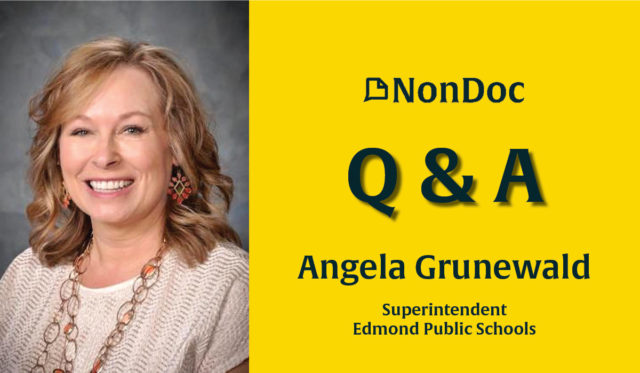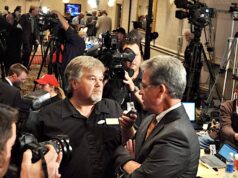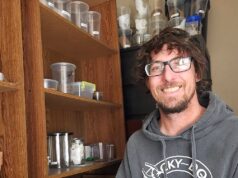
Edmond Public Schools students and educators are heading back to the classroom today, and Angela Grunewald is heading into her second school year as superintendent of the 24,000-student district.
Grunewald has been in public education for more than 30 years, serving as both a teacher and administrator in EPS and elsewhere. She stepped into her current role in June 2021 as the district — the largest full-time employer in Edmond — is facing rapid growth. And like many districts around the state, Edmond Public Schools has seen heated debates about curriculum, COVID-19 protocols and more.
Grunewald, who holds a doctorate from Oklahoma State University, started her career in public education as a teacher at Snyder Public Schools. She then taught in El Reno and in the tiny town of Leedey before joining EPS, where she served as an assistant principal and principal at Charles Haskell Elementary School from 2003 to 2008. Between 2008 and 2011, she was the principal of Sequoyah Middle School.
Grunewald then moved into district administration, overseeing curriculum and instruction in Piedmont Public Schools and then in Mustang Public Schools.
She returned to EPS in 2016 to work as the executive director of elementary education. She was promoted to associate superintendent for educational services before taking the job as superintendent June 2021.
In this back-to-school Q&A, Grunewald answers questions about her background, the top issues facing the district and the opportunities available to students in Edmond.
The conversation has been lightly edited for grammar and clarity.
Tell us about yourself. Where did you grow up and what drew you to public education?
I grew up in Woodward, Oklahoma. I wanted to become a teacher because of my sixth-grade teacher, Ms. Randall. She made me feel special and made school fun.
You first joined EPS in 2003. What do you think has changed most in the past two decades?
Growth and technology. When I first started here, at Charles Haskell, the intersection at 150th Street and Pennsylvania Avenue featured open fields. We were also just getting SMART Boards in a few classes and didn’t even think about the potential for student devices.
In your opinion, what is the most pressing issue currently facing EPS?
Our biggest need is to address the learning loss and mental health concerns from COVID. We are adding more counselors and services, as well as making sure we are strategically addressing learning loss through PLCs (professional learning communities) and MTSS (multi-tiered systems of support).
The Legislature passed HB 1775 in 2021 to limit certain conversations about race. Recently, Tulsa and Mustang Public Schools received accreditation warnings after reported violations of the law. How do you ensure Edmond students are being taught the difficult history of Oklahoma and America without educators violating this controversial law?
The law clearly states that we can and should teach our Oklahoma standards.
Since the election four months ago, can you speak to your time working with Courtney Hobgood and Marcus Jones, the newest members on the Edmond Public Schools Board?
Mrs. Hobgood and Mr. Jones are exceptional board members. They are passionate about schools and want to help make them better. They listen to the community and seek to understand all the intricacies of overseeing a large school district.
What programs offered within EPS do you think make the district unique?
There are many outstanding programs offered within our district. The following are just a few.
Edmond has one of the most robust Advanced Placement programs in the state, offering more than 30 AP classes. Edmond also has 11 National Blue Ribbon Schools of Excellence — the most of any district in the state. Eight schools have been named Great Expectations (GE) Model Schools. Our award-winning bands and orchestras have been invited to play in London’s New Year’s Day parade, and on the stages at New York’s Carnegie Hall and Baltimore’s Strathmore Center.
Our district was among the first in the state to implement an elementary school computer science curriculum. We also have very robust Technology Student Association (TSA) chapters at many high schools and middle schools. These students gain valuable skills in architecture, construction, leadership, computer science, information technology, computer-aided design, inventions and innovations, problem-solving, dragsters, robotics, research and more.
Also, the National Association of Agricultural Educators named Edmond’s Future Farmers of America program the outstanding middle and secondary agricultural program. Edmond’s high schools collectively raise $500,000 to $1 million each year for their selected charities. Many students remark that the annual fundraising weeks are one of their most impactful high school experiences. Several former fundraising chairs are now leading and working for nonprofits in the area.





















